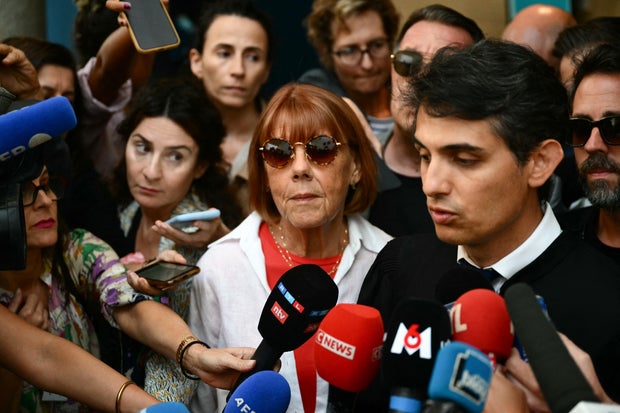CBS News
French woman Gisele Pelicot says police uncovering alleged mass rape organized by husband “saved her life”

A French woman whose husband is accused of enlisting dozens of strangers to rape her while she was drugged said at his trial Thursday that police had saved her life by uncovering the crimes.
“The police saved my life by investigating Mister P.’s computer,” Gisele Pelicot told the court in the southern city of Avignon, referring to her husband, who is one of 51 men from all walks of life standing trial over the alleged attacks.
Pelicot had initially wished to remain anonymous but has since appeared in public and her lawyer said she’d agreed to be fully identified. She insisted that the trial take place in public so the full facts of the case could emerge.
CHRISTOPHE SIMON/AFP/Getty
Pelicot, now 71, had remained stoic and silent through the three first days of the high-profile case, communicating only through her lawyers. But she revealed her emotion on the stand Thursday when she recounted the moment in November 2020 when investigators first showed her the images of a decade of sexual abuse allegedly orchestrated and filmed by her husband, identified in court as Dominique P.
“My world is falling apart. For me, everything is falling apart. Everything I have built up over 50 years,” she told the court. “Inside, I’m in ruins.”
“Frankly, these are scenes of horror for me,” she said of the images as her husband listened with his head bowed.
“I’m lying motionless on the bed, being raped,” she added, calling the video “barbaric.”
“They treat me like a rag doll,” she told the panel of five judges, adding that she had only gained the courage to watch the video in May, years after she was first made aware of it.
“Don’t talk to me about sex scenes. These are rape scenes,” she said, stressing that she had never engaged in swinging or any other libertine sex.
Lawyers for some of the defendants questioned in court on Wednesday whether the couple had had a libertine relationship, or whether it was credible that Pelicot had noticed nothing for the entire decade of the alleged abuse.
The line of questioning appeared to upset the plaintiff, although she stayed put while her three children briefly left the courtroom.
“Of course she was offended,” said her lawyer, Antoine Camus. “She wanted to respond. We felt her bobbing up and down behind us, saying, ‘I want to answer. I just have to answer’ and we told her, ‘Tomorrow!'”
“I am absolutely not complicit,” she said Thursday. “I never pretended to sleep, nothing of the sort.”
A folder labelled “abuse”
Pelicot’s husband is accused of abusing her between 2011 and 2020, drugging her with sleeping pills and then recruiting dozens of strangers to rape her, lead investigator Jeremie Bosse Platiere told the court Wednesday.
Dominique Pelicot was exposed by chance after he was caught filming up women’s skirts in a local supermarket.
On Tuesday, he answered “yes” when asked if he was guilty of the accusations against him.
The 71-year-old father of three allegedly documented his actions with meticulous precision on a hard drive with a folder labelled “abuse.”
That enabled French police to track down more than 50 men suspected of raping his wife while she was drugged. A third of them were identified using facial recognition software, Bosse Platiere said.
The senior police chief for the Hautes-Alpes region said he had hand-picked investigators “who had the stomach” to face videos and images of abuse.
As part of their investigation police drew up a list of 72 individuals suspected of abusing Pelicot. The investigators counted around 200 instances of alleged rape, by her husband and more than 90 strangers they say he enlisted through an adult website.
Prosecutors say the alleged assaults took place between July 2011 and October 2020, mostly in the couple’s home in Mazan, a village of 6,000 people in the southern region of Provence.
Most of the suspects face up to 20 years in prison for aggravated rape if they’re convicted.
Eighteen of the 51 accused are in custody, including Dominique Pelicot, but 32 other defendants are attending the trial as free men, having not been placed under arrest. One other suspect, who remains at large, will be tried in absentia.
The trial is expected to last four months, until late December, which Camus said would be “a totally awful ordeal” for Gisele Pelicot.
“For the first time, she will have to live through the rapes to which she was subjected for 10 years,” of which she has “no memory,” he told AFP.
Dominique Pelicot admitted to investigators that he gave his wife powerful tranquilizers, often Temesta, an anxiety-reducing drug.
The alleged abuse started when the couple was living near Paris and continued after they moved to Mazan two years later, prosecutors said.
The suspect was said to have given the men strict instructions so they would not wake her up when they abused her during the night. No aftershave or cigarette odor were allowed, and they had to warm their hands before touching her, and get undressed in the kitchen so they would not accidentally leave clothes behind in the bedroom.
CBS News
Dishing up space food – CBS News

Watch CBS News
Be the first to know
Get browser notifications for breaking news, live events, and exclusive reporting.
CBS News
In praise of Seattle-style teriyaki

Watch CBS News
Be the first to know
Get browser notifications for breaking news, live events, and exclusive reporting.
CBS News
Gazan chefs cook up hope and humanity for online audience

Renad Atallah is an unlikely internet sensation: a 10-year-old chef, with a repertoire of simple recipes, cooking in war-torn Gaza. She has nearly a million followers on Instagram, who’ve witnessed her delight as she unpacks parcels of food aid.
CBS News
We interviewed Renad via satellite, though we were just 50 miles away, in Tel Aviv. [Israel doesn’t allow outside journalists into Gaza, except on brief trips with the country’s military.]
“There are a lot of dishes I’d like to cook, but the ingredients aren’t available in the market,” Renad told us. “Milk used to be easy to buy, but now it’s become very expensive.”
I asked, “How does it feel when so many people like your internet videos?”
“All the comments were positive,” she said. “When I’m feeling tired or sad and I want something to cheer me up, I read the comments.”
We sent a local camera crew to Renad’s home as she made Ful, a traditional Middle Eastern bean stew. Her older sister Noorhan says they never expected the videos to go viral. “Amazing food,” Noorhan said, who added that her sibling made her “very surprised!”
After more than a year of war, the Gaza Strip lies in ruins. Nearly everyone has been displaced from their homes. The United Nations says close to two million people are experiencing critical levels of hunger.
Hamada Shaqoura is another chef showing the outside world how Gazans are getting by, relying on food from aid packages, and cooking with a single gas burner in a tent.
Shaqoura also volunteers with the charity Watermelon Relief, which makes sweet treats for Gaza’s children.
In his videos online, Shaqoura always appears very serious. Asked why, he replied, “The situation does not call for smiling. What you see on screen will never show you how hard life is here.”
Before dawn one recent morning in Israel, we watched the UN’s World Food Program load nearly two dozen trucks with flour, headed across the border. The problem is not a lack of food; the problem is getting the food into the Gaza Strip, and into the hands of those who desperately need it.
The UN has repeatedly accused Israel of obstructing aid deliveries to Gaza. Israel’s government denies that, and claims that Hamas is hijacking aid.
“For all the actors that are on the ground, let the humanitarians do their work,” said Antoine Renard, the World Food Program’s director in the Palestinian territories.
I asked, “Some people might see these two chefs and think, well, they’re cooking, they have food.”
“They have food, but they don’t have the right food; they’re trying to accommodate with anything that they can find,” Renard said.
Even in our darkest hour, food can bring comfort. But for many in Gaza, there’s only the anxiety of not knowing where they’ll find their next meal.
For more info:
Story produced by Mikaela Bufano. Editor: Carol Ross.
See also:
“Sunday Morning” 2024 “Food Issue” recipe index
Delicious menu suggestions from top chefs, cookbook authors, food writers, restaurateurs, and the editors of Food & Wine magazine.










